World Cup Rewind: 2003 - When Wales unearthed Nuggets of golden future
- Published
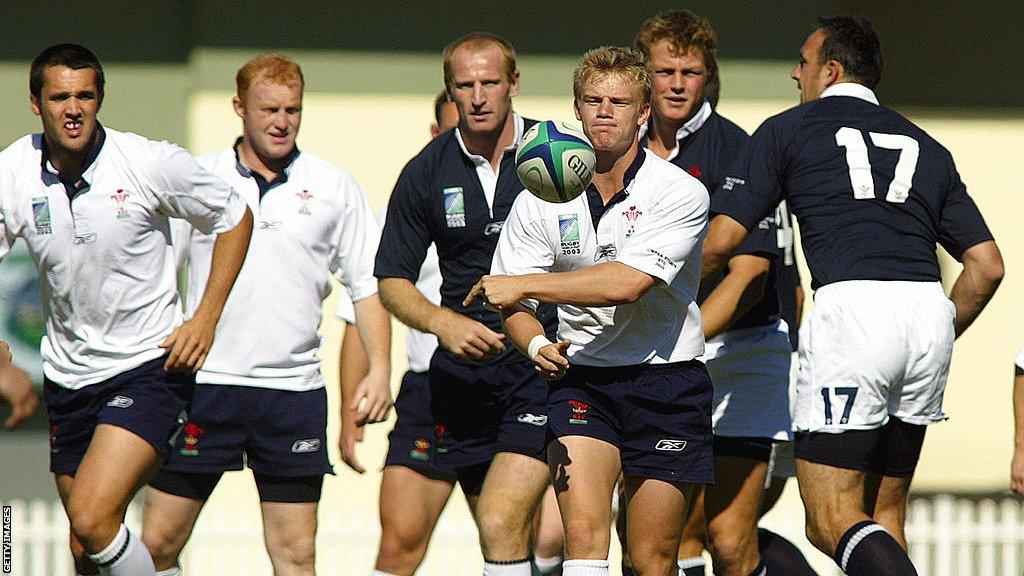
Dwayne Peel (centre) is now the head coach at Scarlets while Martyn Williams (second from left) is Wales team manager
The World Cup in Australia was to mark a turning point for Welsh rugby.
Gone was a generation of greats such as Scott Quinnell, Scott Gibbs and Rob Howley, as well as coach Graham Henry.
Now it was another Kiwi who almost changed the course of rugby history but at the same time made the rugby public fall back in love with Wales and set a path for its most successful period.
In the latest of a series reflecting on past World Cups, BBC Wales Sport looks back at 2003 with Martyn Williams.
The Cardiff flanker, known affectionately as Nugget for the colour of his hair, would be part of that new golden generation whose roots can be traced back to the 2003 World Cup in Australia.
"You can easily trace the roots of the success we enjoyed in the years that followed back to that tournament. It was a turning point," said Williams, now Wales team manager.
"Up until then there were players who had only ever really lost in a Wales jersey but the confidence and belief they gained from that tournament would set them on their way to win a Grand Slam just 15 months later and beyond."
At the time, as with most previous World Cup years, Welsh rugby was in the doldrums as Hansen's side endured a record 11-game losing streak.
The run included a Six Nations whitewash, a record 55-3 humiliation in New Zealand and a 40-point defeat at home to a second-string England that left Hansen's job hanging by a thread just weeks before the World Cup.
"You would have thought it was all doom and gloom at the time but it wasn't. We honestly believed in what we were doing," said Williams.
"Of course we were hurting. We'd been tonked in Hamilton when Jerry Collins almost buried Colin Charvis and we got spanked by England B. Then apparently David Moffett [WRU chief executive] asked Steve to change the team for the warm up game against Scotland because if we lost, he'd be out.
"He urged Moffett to stick with him and his plan, and it's a good job he did."
A simplified World Cup format meant more pool matches but also some woefully one-sided contests, that included England's 111 points against Uruguay and Australia's record 142-0 thrashing of Namibia.
However there were still some humdingers. Ireland edged Argentina 16-15 only to lose 17-16 to hosts Australia. Scotland needed a yellow card and late try to beat Fiji and England were given a scare by Samoa in a match in which they briefly fielded 16 players and were later fined £10,000.
And there was a first Test game in Tasmania, where 15,000 neutral fans were told to cheer for Romania or Namibia depending on whether they were born on an odd or even date.
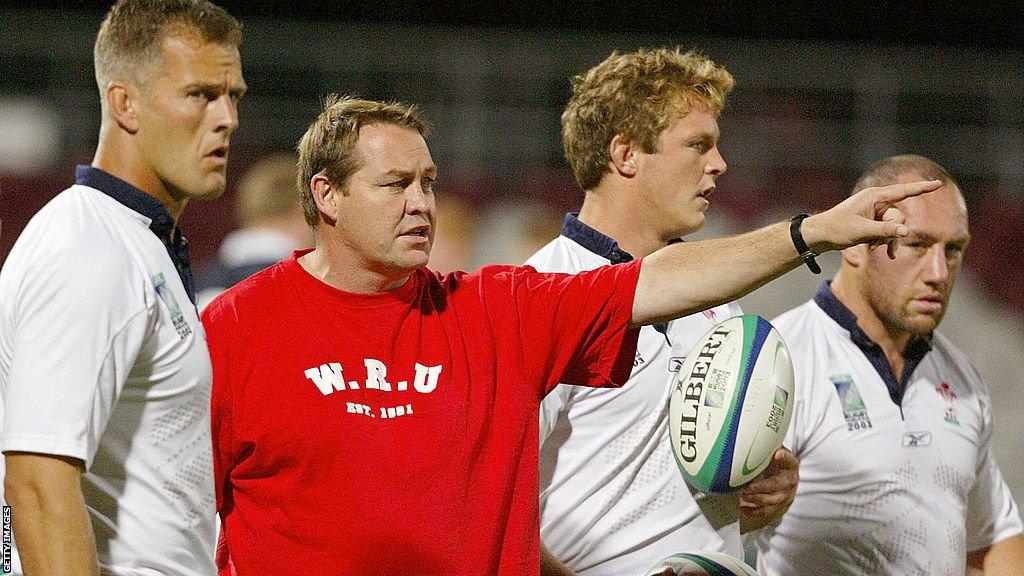
Steve Hansen coached Wales for two years before winning the World Cup with New Zealand
Wales were based in Canberra, far from the delights of Sydney or the Gold Coast, but it would prove the making of the squad.
"It was a young group that had a lot of growing up to do both on and off the pitch," said Williams.
"Steve and Scott Johnson [assistant coach] made us live in self-contained apartments. We had to shop for food and cook for ourselves which was a great concept.
"You could tell the boys who had been to university and those who had relied on their mams or wives. I was terrible at cooking but I was rooming with Iestyn Harris who would give anything a go.
"Alfie [Gareth Thomas] was easily the fussiest eater while the likes of Adam Jones and Gethin Jenkins literally ate anything.
"But it was a masterstroke for team bonding and really made us appreciate any hotels we stayed at - but it's a miracle no-one got food poisoning! I'm not sure I could get away with that these days."
Victories over Canada (41-10), Tonga (27-20) and then revenge against Italy (27-15) booked Wales' place in the quarter-finals that many - including one player - had not expected.
"Ceri Sweeney had accidentally booked a family trip on the same weekend as the quarters so he got absolutely rinsed," said Williams.
"Another player - I can't name him - was voted one of the ugliest in the World Cup by a national newspaper. So you can imagine how that went down with the rest of the squad."
Those victories meant Hansen was able to rest key players for the final pool game against the All Blacks but the decision to make ten changes brought accusations of waving the white flag.
However these 'lambs to the slaughter', as one newspaper headline described, produced a thrilling display that lit up Sydney and stunned the tournament.
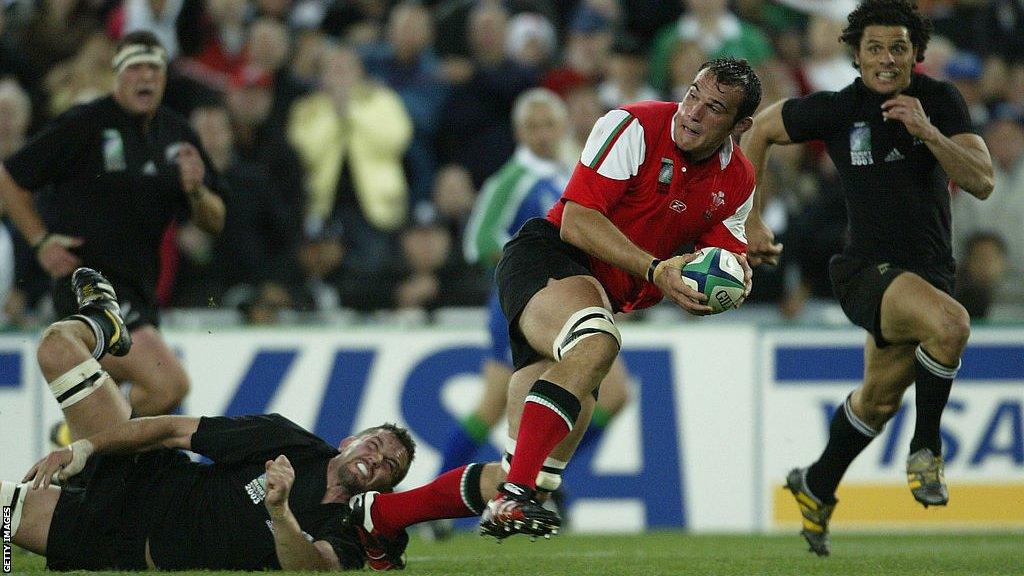
Wales' 37 points in 2003 remains their record score against New Zealand
England's post-match press conference in Brisbane was even brought to an early close as players and media looked on in disbelief as Wales led the All Blacks 37-33 in the second half.
It was also the night the world was re-introduced to Shane Williams.
"People have different memories about whether the way we played that day was planned or an accident," said Martyn Williams.
"Steve definitely saw the game as a chance to rest players for the quarter-final and give a chance to anyone who hadn't had any game time because we almost knew we were going to lose.
"Shane had been drafted into the squad late as a third scrum-half, even though he'd barely played in the position. He'd also been ill all week but finally got a chance and just went for it.
"Then Alfie had to come on early as a full-back even though he'd never even trained in that position, so we decided, rather than kick, we would try to keep possession by running everything - and for a while, it worked.
"Maybe we had nothing to lose, perhaps the All Blacks underestimated us, but for whatever reason, everything we had trained for over the previous 14 months fell into place. Perhaps it was fate, but that was a turning point."
Wales scored more points against the All Blacks than ever, before finally running out of steam 53-37. However the bluetouch paper had been lit.
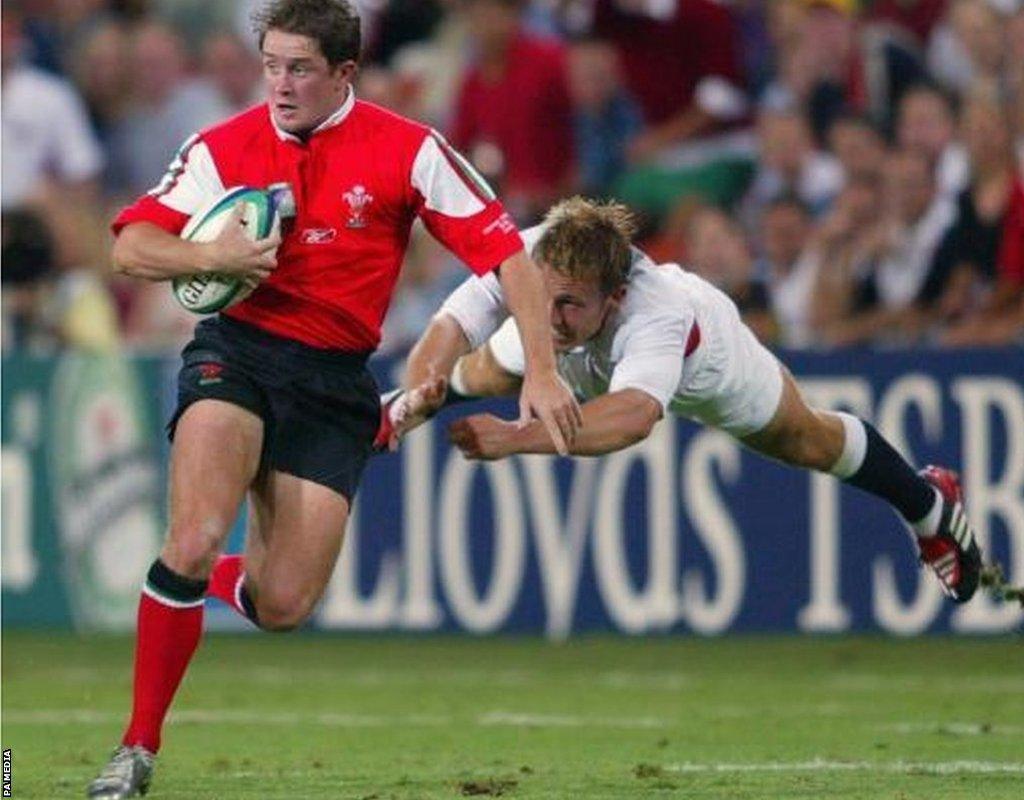
Shane Williams won 87 Wales caps along with four for the British and Irish Lions
A week later, Wales again shook one of the World Cup favourites - but still suffered the agony of defeat against England in Brisbane.
Wales were rampant and would have led by more than 10-3 at half-time had Robert Sidoli not lost possession over the line.
They still out-scored England three tries to one but 23 points from the boot of Jonny Wilkinson and a masterclass in tactical kicking by Mike Catt - a half-time replacement - saw England stagger into the semi-finals. How different World Cup history could have been.
"We played so well and gave them a hell of a scare but the difference was knowing how to win big games," said Williams, a try-scorer that night.
"We had a very young group while England were packed with Grand Slam winners and British Lions. They knew what it took to squeeze out a win even when you play badly."
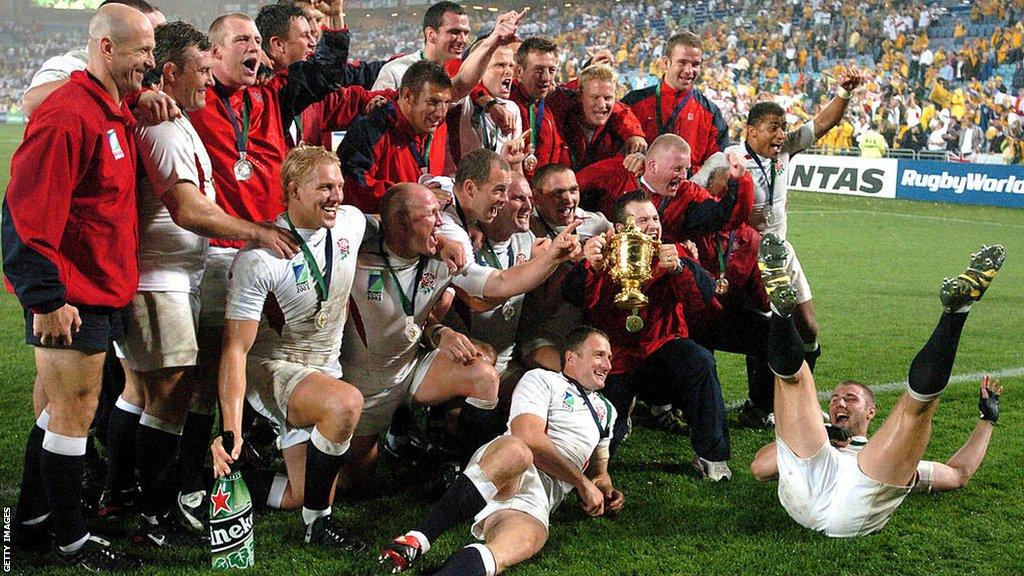
England became the first northern hemisphere team to win the World Cup
England went on to lift the cup with Jonny Wilkinson's extra-time drop goal against the defending champions Australia.
"As much as it pained me as a Welshman, I actually wanted England to win the final," said Williams.
"You always want the crumb of comfort that you were knocked out by the eventual winners and a northern hemisphere team winning was good for the game."
What was not so good for the game was the off-hand way Australian Prime Minster John Howard presented the Webb Elis trophy to Martin Johnson - for which he was roundly criticised, external - but history had been made and the seeds of Wales' success were laid.